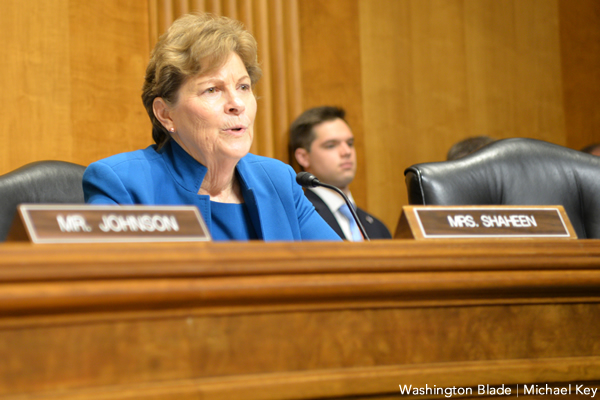National
Project 2025’s ‘War on Porn’ threatens sex workers, LGBTQ community
Far-right plan for second Trump administration includes 32 anti-LGBTQ provisions

Civil liberties and LGBTQ rights advocates have expressed alarm that a proposal to criminalize pornography in a 920-page far-right blueprint for the first 180 days of a second Trump administration known as Project 2025 would have a far-reaching impact that threatens the rights of sex workers and the LGBTQ community, especially the transgender community.
Project 2025 was created by a coalition of several dozen conservative and religious-right organizations led by the D.C.-based Heritage Foundation, with most of them having opposed LGBTQ rights for many years and several having been designated as anti-LGBTQ hate groups by the Southern Poverty Law Center.
LGBTQ rights organizations, including the Human Rights Campaign, the nation’s largest LGBTQ rights group, and the LGBTQ advocacy group GLAAD, point out that Project 2025 includes at least 32 specific provisions that call for rolling back LGBTQ rights, including marriage equality and LGBTQ nondiscrimination protections in federal government agencies.
“Project 2025 demonstrates what four years of a Trump-Vance administration would look like,” HRC said in a statement. “It is a wrecking ball aimed at the very foundations of civil rights, LGBTQ+ rights, health care access, voting rights, and environmental protections,” the statement says.
GLAAD President and CEO Sarah Kate Ellis said in a statement that Project 2025 “would create an America where the freedoms that are a hallmark to our Democracy are replaced with authoritarianism and the progress we have made for LGBTQ people, people of color, women, and other marginalized communities is stripped away.”
Former President Donald Trump, who won the Republican presidential nomination last month at the GOP convention in Milwaukee, has disavowed Project 2025, saying he played no role in creating it and he does not agree with many of its provisions. But political observers point out that former Trump administration officials and many longtime Trump supporters played a lead role in developing Project 2025. Democratic Party leaders are predicting much of Project 2025’s content, including its anti-LGBTQ provisions, would likely be backed by a Trump administration.
With that as a backdrop, civil liberties advocates and representatives of the adult entertainment industry, including sex worker advocacy groups, are saying criminalization of pornography as proposed by Project 2025 would have far reaching negative consequences, including a negative impact on the LGBTQ community.
“The impact would be vast, and censorship of ‘pornography’ is central to this project,” according to a statement released by the Free Speech Coalition, which describes itself as a nonpartisan trade association for the adult entertainment industry. “The mandate calls for banning ‘pornography’ – broadly defined to include LGBTQ+ content – and imprisoning those who distribute it,” the statement says.
The Free Speech Coalition and other groups and activists opposing a ban on pornography point out that the text of Project 2025’s provision calling for a ban on porn seeks to create a link between what it calls harmful pornography and the transgender and LGBTQ communities.
Here is the full text of the Project 2025 provision for criminalizing pornography:
“Pornography, manifested today in the omnipresent propagation of transgender ideology and sexualization of children, for instance, is not a political Gordian knot inextricably binding up disparate claims about free speech, property rights, sexual liberation, and child welfare. It has no claim to First Amendment protection. Its purveyors are child predators and misogynistic exploiters of women. Their product is as addictive as any illicit drug and as psychologically destructive as any crime. Pornography should be outlawed. The people who produce and distribute it should be imprisoned. Educators and public librarians who purvey it should be classed as registered sex offenders. And telecommunications and technology firms that facilitate its spread should be shuttered.”
According to the Free Speech Coalition, “With new laws calling for the imprisonment of those who produce or distribute adult content, Project 2025 advocates for the arrest of millions of adult content creators – a War on Porn that might mimic the War on Drugs.”
The group adds in its statement, “This risk to anyone working in the sex industry is enormous but given the project’s twin concerns about LGBTQ+ content, would likely fall most heavily on LGBTQ+ sex workers, pushing them further into the margins, and increasing risk of violence and exploitation.”
Among those who share that concern is Cyndee Clay, executive director of the D.C.-based sex worker advocacy group HIPS. “Calls to outlaw pornography are problematic enough, but they also take one more legal option for sex work away from people who do sex work,” Clay told the Washington Blade. “What’s more concerning is this push from Project 2025 seems to be less about pornography itself and more about attacking trans rights and trans voices,” Clay said.
The Blade’s attempt to reach some of the largest online porn sites like Pornhub and the popular gay dating and sex meet-up site Grindr were unsuccessful. The ACLU, which has championed rights of sexual freedom for many years, didn’t respond to the Blade’s request for comment on Project 2025. But in a brief statement on its website, the ACLU criticizes Project 2025 as a plan to “dismantle policies put in place to protect our civil rights and liberties and establish a more authoritarian rule of law.”
The statement adds, “Along with our network of affiliates and coalition partners in all 50 states, we are armed with tools and tactics to protect against executive action that would take away our rights.”
Blair Hopkins, executive director of the Sex Worker Outreach Project Behind Bars, known as SWOP, said she believes the large adult industry companies like Pornhub, and others will be working behind the scenes to oppose Project 2025. Hopkins said the criminalization of porn would have a dramatic impact on the multi-million adult entertainment industry, which through its online sites and employment of sex workers as actors and support workers is an important segment of the nation’s economy.
According to its website, Pornhub alone has more than 100 million daily visits to its adult website and 36 billion visits per year. It says it has 20 million registered Pornhub users.
Hopkins said Pornhub has provided financial support for SWOP and other organizations that support sex workers.
“It’s been said that sex workers are the canary in the coal mine when it comes to any kind of civil rights,” Hopkins told the Blade. “And that is proven to be true over and over again,” she said. “So, what I think they’re talking about is not only will pornography be banned and criminalized, but also that anything can be categorized as pornography. And that is directly targeting the LGBTQ community.”
Todd Evans, executive director of the National LGBT Media Association, which represents LGBTQ news publications across the country, said a ban on pornography like what is being proposed by Project 2025 could have a negative impact on LGBTQ media outlets.
“Just think about it,” he said. “Who is defining pornography? What does that mean? Is Michelangelo’s ‘David’ pornography?”
Evans added, “It definitely has an effect on LGBT media because it goes back to what that definition of pornography is. And does it depend on who is delivering it? Like if it’s an LGBT publication, is that definition harsher than maybe a mainstream publication?”
Adult entertainment advocates have also pointed out that access to porn has already effectively been “banned” in several states that have passed laws calling for the adult sites to require anyone visiting the site to provide an identification document such as a driver’s license to show they are an adult. This has prompted some porn sites, including Pornhub, to discontinue operating in those states.
U.S. Supreme Court
Lawyers who fought gender affirming care ban at the Supreme Court remain optimistic
Wednesday’s decision, while disappointing, leaves room for more legal challenges

Following the U.S. Supreme Court’s ruling on Wednesday upholding Tennessee’s ban on medical care for transgender minors, several of the plaintiffs’ attorneys expressed disappointment with the outcome but stressed that the fight was not over.
While the decision in U.S. v. Skrmetti will shield Tennessee and more than 20 other states from litigation challenging their anti-trans healthcare restrictions, the majority decision was not so broadly written that opportunities to fight for expanded rights and protections — or to push back against the Trump-Vance administration’s discriminatory policies — were extinguished, they said.
Addressing reporters during a press call hours after the decision was released were Chase Strangio, co-director of the ACLU’s LGBTQ & HIV Project, Karen Loewy, director of constitutional law practice at Lambda Legal, and Lucas Cameron-Vaughn, senior staff attorney at the ACLU of Tennessee.
On the one hand, the lawyers were adamant that the conservative justices in the 6-3 majority opinion “got this completely wrong,” as Cameron-Vaughn said, because Tennessee’s law is “clearly a sex based classification and transgender based classification” on its face.
At the same time, he said “the fact that it’s a narrow ruling means that we will continue to fight and stand with trans people and their families in Tennessee with all the tools at our disposal to continue to stand against the assault from the government.”
Explained Strangio, “The court did not rule on whether or not transgender status independently warrants the type of heightened scrutiny that sex based classifications also trigger,” meaning that “lower court decisions — for example, in the 9th and the 4th Circuit that have already recognized that transgender status triggers this type of heightened scrutiny — will remain good law, and that government discrimination targeting transgender people, either through facial classifications or invidious discrimination, are both contexts in which the [Supreme] Court has today explicitly left open for heightened scrutiny.”
“The most immediate effect is on our clients and other young, young transgender people in Tennessee and across the country who need medical care that the government has stepped in to ban,” added Strangio, who is the first transgender attorney to argue before the Supreme Court. “And for them, we are devastated, and we know that we will continue fighting so that government discrimination against transgender people will end.”
“This is a setback in many ways,” he said, “but we continue onward in the fight and we can, you know, hold simultaneously, both the pain of this decision and all of the possibilities of the future we’re building.”
Responding to a question from the Washington Blade about whether the justices considered the potential harms of cutting off access to treatments for young people who have begun to medically transition, Strangio said he and his co-counsel stressed the issue in briefs and during oral argument.
He continued, “I think one of the frustrating things about the type of deference that this court found would apply here” as opposed to a more heightened level of scrutiny “is that they don’t really look at the underlying evidence, and so they can just sort of defer broadly and uncritically to state legislatures or legislatures more more generally.”
Strangio noted that while the dissenting opinions from the liberal justices, particularly Sonia Sotomayor’s, addressed harms related to the sudden loss of access to treatments for transgender youth, “that did not figure in in the majority opinions, in the ways that we all wished that it would have.”
“And we know how devastating it is for people to lose access to medically necessary care,” he said.
Responding to the same question, Loewy said “I would just lift up Justice Sotomayor’s dissent in as much as her questioning of Tennessee’s attorneys during argument was a recognition of the real harms to our actual clients. And her dissent really talks about what it meant before our clients had access to the gender affirming medical care that they needed, and the real harm of that now being unavailable to them.”
“So, there was definitely some recognition during the discussion, during argument, of what this really means for trans young people,” Loewy said. “And you know, it was clearly not part of the calculus that the majority was willing to really consider.”
U.S. Supreme Court
Supreme Court upholds ban on transgender care for minors
Skrmetti decision among this term’s most highly anticipated rulings

The U.S. Supreme Court on Wednesday upheld a ban on medical interventions for transgender minors in Tennessee, with the three liberal justices dissenting in a ruling that will shield similar laws that block or restrict access to care in more than 20 other states.
Conservative Chief Justice John Roberts, writing for the majority, said questions about the “safety, efficacy, and propriety of medical treatments” should be resolved democratically.
Liberal Justice Sonia Sotomayor argued, in her opinion, that the decision “authorizes, without second thought, untold harm to transgender children and the parents and families who love them,” adding that “Because there is no constitutional justification for that result, I dissent.”
Plaintiffs who challenged Tennessee’s ban were a doctor and three families argued that the policy violated the Equal Protection Clause of the 14th Amendment.
They also emphasized that the care prohibited for minors in the state — puberty delaying medication, hormone therapy, and surgeries — is made available to patients younger than 18 if they are sought for reasons other than gender transitions.
The case, U.S. v. Skrmetti, was among the most anticipated of the court’s June term.
President Donald Trump in February formally reversed course from the Biden-Harris administration’s support for the plaintiffs challenging the Tennessee law, urging the Supreme Court to uphold the ban.
Attorneys, Democratic lawmakers, and medical groups object to the ruling
Representing the plaintiffs in the litigation challenging the ban were the Chase Strangio, co-director of the ACLU’s LGBTQ & HIV Project, Lucas Cameron-Vaughn, senior staff attorney at the ACLU of Tennessee, Karen Loewy, director of constitutional law practice at Lambda Legal, Jennifer Levi, senior director of transgender and queer rights at GLAD Law, Shannon Minter, legal director of the National Center for Lesbian Rights, Sasha Buchert, counsel and director of the Nonbinary and Transgender Rights Project at Lambda Legal, and attorneys with the firm Akin Gump.
“Today’s ruling is a devastating loss for transgender people, our families, and everyone who cares about the Constitution,” said Strangio, who is the first trans lawyer to argue before the Supreme Court. “Though this is a painful setback, it does not mean that transgender people and our allies are left with no options to defend our freedom, our health care, or our lives.”
“The Court left undisturbed Supreme Court and lower court precedent that other examples of discrimination against transgender people are unlawful,” Strangio said. “We are as determined as ever to fight for the dignity and equality of every transgender person and we will continue to do so with defiant strength, a restless resolve, and a lasting commitment to our families, our communities, and the freedom we all deserve.”
“This is a heartbreaking ruling, making it more difficult for transgender youth to escape the danger and trauma of being denied their ability to live and thrive,” said Buchert. “But we will continue to fight fiercely to protect them. Make no mistake, gender-affirming care is often life-saving care, and all major medical associations have determined it to be safe, appropriate, and effective. This is a sad day, and the implications will reverberate for years and across the country, but it does not shake our resolve to continue fighting.”
“The Court today failed to do its job,” said Levi. “When the political system breaks down and legislatures bow to popular hostility, the judiciary must be the Constitution’s backbone. Instead, it chose to look away, abandoning both vulnerable children and the parents who love them. No parent should be forced to watch their child suffer while proven medical care sits beyond their reach because of politics.”
“The Court’s ruling abandons transgender youth and their families to political attacks. It ignored clear discrimination and disregarded its own legal precedent by letting lawmakers target young people for being transgender,” said Minter. “Healthcare decisions belong with families, not politicians. This decision will cause real harm.”
In a press conference on Capitol Hill, Senate Democratic Leader Chuck Schumer (N.Y.) told reporters, “This Supreme Court seems to have forgotten that one of their jobs is to protect individual rights and protect individuals from being discriminated against. It’s an awful decision.”
“On the floor, we had a bill, that the Republicans wanted to take away these rights,” Schumer said. “And we got, I believe, every Democrat voting against it. So it failed because it needed 60 votes. So we’re going to explore every solution.”
U.S. Rep. Pramila Jayapal (D-Wash.) also hosted a press conference, arguing that the court’s decision — and conservative-led efforts to restrict the rights and freedoms of transgender people more broadly — is of a piece with the Republican Party’s broader policy agenda, particularly in Trump’s second term.
In 2019, the congresswoman shared that her daughter, then 22, was trans. When asked on Wednesday whether her staunch opposition to the ruling was both professional and personal, Jayapal said, “I’m not speaking about my personal situation these days” but her family aside, “it’s also personal to me as a member of Congress that represents families who are experiencing the same kinds of issues and the same kind of fear that I hear from people across the country.”
She added, “And so I think what’s important is to recognize that trans people are a tiny percentage of the country and are doing no harm to anyone else. And despite the disinformation, the lies that are being circulated about trans people, I think that we are powerful when we come together, when we realize that these attacks are coordinated and are really about the same thing, which is exerting power over us and taking away our rights in a democracy that should be about allowing everyone to contribute their full selves.”
U.S. Sen. Ed Markey (D-Mass.) said: “Today, hate won. The far-right justices of the Supreme Court endorsed hate and discrimination by delivering a win for Republicans who have relentlessly and cruelly attacked transgender Americans for years. With 25 states already having laws in place that ban gender-affirming care for trans youth, the Supreme Court has cleared the way for families in half of the country to no longer access the medically necessary and life-saving care they need for their children.”
The senator continued, “But here is what no Court nor politician can ever change: trans people will continue to exist. Their health care is lifesaving and essential, and trans rights are human rights. We have a fight ahead of us, but discrimination and hate cannot and must not win.”
U.S. Sen. Jeff Merkley (D-Ore.) said: “Access to medically-necessary care for trans youth saves lives, and the U.S. Supreme Court’s callous decision puts trans youth and their families at risk.
“MAGA extremists across the nation will not stop at banning medically-necessary gender-affirming care for trans youth. The Court’s life-altering decision lays out the playbook for extremist politicians to continue their crusade against trans people and further exclude them from daily life. And this is just the beginning—this decision opens the floodgates for MAGA extremists in state legislatures and Congress to ban medically-necessary care, from gender-affirming care to abortion access.
“This is just wrong—everyone should have access to the care they need, when they need it. No exceptions.
“Let’s get politicians out of the exam room. We will continue to fight these divisive policies in communities nationwide to fully realize the vision of America as a land of freedom and equality for all, and I won’t rest until my Equality Act is signed into law to deliver on this fundamental promise.”
“Today’s decision by the Supreme Court is devastating for young transgender Americans and their families who live in states that decide to put divisive and dehumanizing politics over people,” said U.S. Rep. Mark Takano (D-Wis.), chair of the Congressional Equality Caucus.
“The Court’s ruling upholding Tennessee’s cruel and politically-motivated ban on medically-necessary care for young trans people undermines the ability of transgender patients, their families, and doctors to make medical decisions about accessing evidence-based care without politicians’ interference,” he said.
The congressman added, “The law the Court upheld is an attack on some of the most vulnerable in our community—but we still have other tools to challenge anti-trans laws in courts across the country. As Chair of the Equality Caucus, I am committed to continuing to lead elected officials from across the country in the fight for full equality for transgender people under the law here in Congress.”
“Every parent wants to keep their child healthy. Parents and trans young people have the right to make private health care decisions with their doctors. Today’s ruling allowing Tennessee politicians to interfere in private health care decisions is not only draconian, it’s dangerous and hateful,” said U.S. Rep. Becca Balint (D-Vt.). “I want families who are feeling scared today about the consequences of this decision to know that I’m with you. I’m fighting for you in Congress every single day, and I will not back down.”
Jayapal, Markey, Merkley, Takano, and Balint were among the 164 members of Congress who filed an amicus brief urging the court to preserve access to care.
New York Attorney General Letitia James also released a statement: “At a time when LGBTQ+ communities are under relentless attack, this decision is dangerous and a profound disappointment. Gender-affirming care is essential and lifesaving health care, and denying young people access to it will have devastating consequences.
“Let me be clear: gender-affirming care remains legal and protected in New York, including for young people.
“To the transgender community in Tennessee and across the country: We stand proudly with you. We are strongest together, and we will not let this decision weaken our resolve to build a safer, more just, inclusive, and compassionate nation for all.”
Also issuing a statement was a coalition of seven medical associations that had submitted an amicus brief supporting the plaintiffs — American Academy of Pediatrics, American College of Obstetricians and Gynecologists, American College of Physicians, American Psychiatric Association, Endocrine Society, the National Association of Pediatric Nurse Practitioners, and the American Pediatric Society.
The organizations said:
“As experts dedicated to providing patients with compassionate, evidence-based care every day, we are disappointed in the United States vs. Skrmetti decision, which increases the likelihood that other states will limit or eliminate families’ and patients’ ability to access medical care.
“As doctors, nurse practitioners, and nurses, we believe that every patient is different. Decisions about medical care must be based on individualized assessments by qualified professionals in consultation with the patient and their parents or legal guardians and guided by well-designed medical evidence. This Supreme Court decision strips patients and families of the choice to direct their own health care.
“Every patient should have access to the medical care they need. Health care professionals must be able to rely on their training, education, and expertise to provide appropriate care based on the needs and values of each patient and their family, without bans or interference.”
LGBTQ and civil rights advocacy groups object to the ruling
Allison Scott, president of the Campaign for Southern Equality, said ““I am heartbroken today. No one should be forced to leave their home state to access healthcare – and it is outrageous to see the U.S. Supreme Court uphold these bans and continue to allow the government to interfere with the personal medical decisions of families.”
“The Court’s ruling can’t change what we know in our bones: our identities, our families, and our lives are strong, worthy, and not up for debate by extremists,” she said. “The Trans Youth Emergency Project will be here to help families navigate this painful time.”
“Today, the Supreme Court took the place of parents and doctors and stripped away their ability to make private, lifesaving decisions for their children,” said GLAAD President and CEO Sarah Kate Ellis. “This ruling is a chilling step toward unchecked government overreach, intruding on the most personal aspects of our private lives.”
She added, “All families are now less safe and left vulnerable to politicians and a Court that has abandoned its duty to protect personal liberties. Every family deserves the freedom to make the medical decisions that help their children live, thrive, and be well.”
“This is a devastating and deeply dangerous decision that carries irreversible harm to transgender youth and their families. The majority’s opinion politicizes decades of medical consensus, ignores the Constitution’s mandate of equal protection, and turns its back on youth and their families,” said Skye Perryman, president and CEO of Democracy Forward.
“Our team at Democracy Forward will continue to work every day to support transgender people, including young people, their families, and communities, and we will never give up making the Constitution’s guarantee of equal protection under the law a reality for all people,” she said.
National LGBTQ Task Force President Kierra Johnson said: “Gender affirming care can mean the difference between life and death for our transgender youth. Today, the Supreme Court rejected the science and authorization of gender affirming care, upheld harmful bans, and denied the lived experiences of trans youth.
“The Supreme Court has now rolled back critical protections against discrimination on the basis of sex. This is an especially devastating moment for transgender youth, their parents and their doctors across the country. Tennessee’s ban on essential medical care — and other similar state bans — will continue to wreak havoc on the lives of these families.
“What we know is this: transgender youth denied access to appropriate medical care are in danger of worse physical and mental health outcomes.
“Americans look to the Supreme Court as the highest court of the land, making decisions with long term impact in these critical times; decisions that speak to the value certain communities. Transgender youth are often overlooked, undervalued, and lack the protection that they deserve as both minors and transgender community members. Gender dysphoria impacts more than the physicality of a person and, when left untreated, may result in anxiety and depression. When there is no legal doctrine that speaks to pertinence of gender affirming care, it shows that the law is not on their side, discrediting and disenfranchising a community while obliterating their humanity. ”
Imara Jones, CEO of TransLash Media, said: Today the Supreme Court used the greatest hits of discredited anti-trans, pseudoscientific ideas in order to rule against the equal access of trans kids to healthcare. This is healthcare that is safe, supported by every mainstream medical association, and which is granted with the consent of youth’s parents.
“Moreover, the Court could only issue such a ruling by overlooking the obvious: The denial of equal access to healthcare for trans kids is sex discrimination. Gender-affirming treatments are allowed for some children but not others under the Tennessee law SB1, which explicitly states as one of its goals to encourage minors to ‘appreciate their sex.’
“So what they did here is the equivalent of denying a person’s race, in order to declare that racial discrimination laws don’t apply.
“Now, while the Skirmetti ruling is not as sweeping as it could have been, because it leaves the door open to future cases on sports and bathrooms, it will likely turbocharge attempts to exempt trans people from Constitutional protections. What the court has done is give these efforts the sheen of judicial legitimacy, and a road map for how to do so, by directing them to leave out the explicit targeting of trans people.
“Because as long as the attempts to push trans people outside of the bounds of public life using the law are implicit, then governmental entities have free reign to do so, now.
“The success of manipulating legal, scientific, and media organizations with anti-trans disinformation by Christian Nationalist and authoritarian entities is crystal clear in this decision.”
“LPAC is devastated that the Supreme Court has turned away from experts like the American Academy of Pediatrics and hard data showing that health care for trans youth improves physical and mental health, and instead succumbed to political pressure,” said Janelle Perez, executive director of LPAC. “This cruel decision opens the floodgates for politicians to decide what we and our children need to be healthy. These are decisions that should be made by families and healthcare providers, not politicians.”
Human Rights Campaign President Kelley Robinson said: “Today’s Supreme Court decision is a devastating blow to transgender youth and the families who love them, but it will not break our resolve. Families may now have to make the heartbreaking choice to leave their state or split their families, or take on extensive financial burdens, in order to ensure that their kids can access medically necessary care.
“This Court chose to allow politicians to interfere in medical decisions that should be made by doctors, patients, and families—a cruel betrayal of the children who needed them to stand up for justice when it mattered most.
“As parents, advocates, and community leaders, we know that our fight doesn’t end in courtrooms—it lives in our communities, our hearts, and our unwavering commitment to each other. Still, we will not be deterred. We will support families forced to make impossible choices, fund legal challenges, and build a movement so powerful that no politician can ignore us. Together, we will turn this pain into power and keep fighting until every transgender person in America can live with dignity, safety, and the freedom to be who they are.”
Tennessee AG and Log Cabin Republicans celebrate the ruling
Tennessee Attorney General Jonathan Skrmetti said, “In today’s historic Supreme Court win, the common sense of Tennessee voters prevailed over judicial activism. A bipartisan supermajority of Tennessee’s elected representatives carefully considered the evidence and voted to protect kids from irreversible decisions they cannot yet fully understand.”
The AG continued, “I commend the Tennessee legislature and Governor Lee for their courage in passing this legislation and supporting our litigation despite withering opposition from the Biden administration, LGBT special interest groups, social justice activists, the American Medical Association, the American Bar Association, and even Hollywood.”
Log Cabin Republicans interim executive director Ed Williams released the following statement:
“The U.S. Supreme Court just upheld Tennessee’s law prohibiting trans medical surgeries and treatments for minors. This decision is not ‘anti-trans.’ It is a historic and critical win for children and common-sense. The majority of Americans support equal treatment for trans Americans and protections from discrimination. They also back laws like Tennessee’s, which protect children from receiving life-altering and irreversible medical procedures or treatments often pushed on them by a zealous cabal that views children as pawns in their gender ideology crusade.
“LGBT conservatives have long believed there is a middle-road that upholds respect, inclusion, and protection for trans Americans while curbing the excesses of a radical political movement attempting to push its bizarre agenda in sports, schools, governments, and hospitals. Today’s Supreme Court is a step in the right direction.”
The Washington Blade will update this story.
National
Baldwin, Pocan named on alleged Minn. shooter’s target lists
Gunman killed state lawmaker, husband on Saturday

U.S. Sen. Tammy Baldwin and U.S. Rep. Mark Pocan, Democrats of Wisconsin, were named on lists of targets belonging to the man suspected of killing Minnesota state Rep. Melissa Hortman and her husband and of injuring Minnesota state Sen. John Hoffman and his wife.
The Hoffmans sustained multiple gunshot wounds and are reportedly in serious but stable condition.
Vance Boelter, the suspect, was apprehended on Sunday in connection with the shootings, which occurred on Saturday. He faces federal murder and stalking charges as well as state-level murder and attempted murder charges.
“Senator Baldwin was informed by law enforcement that she was included on the alleged shooter’s list of names,” Baldwin’s Communications Director Eli Rosen told Channel3000.com. “She is grateful for law enforcement’s swift action to keep the community safe and remains focused on the things that matter most here: honoring the legacy and life of Rep. Melissa Hortman and her husband, Mark, praying for the other victims who are fighting for their lives, and condemning this abhorrent, senseless political violence.”
“I recently heard that my name was in one of the Minnesota shooting suspect’s notebooks and I’m appreciative that law enforcement apprehended the suspect,” Pocan said in a statement to Channel3000.com. “I will not back down in the face of terror, however, we as elected officials, must do better to lower the temperature. That said, my schedule remains unchanged.”
The news outlet reported on Monday that Baldwin’s name appeared on a list of 70 targets, while Pocan’s name was found on additional documents. The senator and congressman are both openly LGBTQ.
Democratic U.S. Reps. Greg Landsman (Ohio), Hillary Schotlen (Mich.), Veronica Escobar (Texas), and Joaquin Castro (Texas) also confirmed that their names appeared in notebooks recovered from Boelter’s vehicle.
Other Democrats who were reportedly targeted but whose offices have not yet provided confirmation as of Tuesday afternoon include LGBTQ congresswoman Angie Craig, Minnesota Gov. Tim Walz, U.S. Sen. Tina Smith, U.S. Rep. Ilhan Omar, and Attorney General Keith Ellison, all from Minnesota, along with U.S. Sen. Tammy Duckworth of Illinois, U.S. Rep. Nikki Budzinski of Illinois, and U.S. Rep. Emanuel Cleaver of Missouri.
Walz called the shootings a “politically motivated assassination.”
-

 U.S. Supreme Court14 hours ago
U.S. Supreme Court14 hours agoSupreme Court upholds ban on transgender care for minors
-

 Books5 days ago
Books5 days agoCelebrate Pride month by reading these books
-

 Opinions5 days ago
Opinions5 days agoFaith leaders celebrate WorldPride at interfaith service
-

 Real Estate5 days ago
Real Estate5 days agoNo Rose, your interest rate has nothing to do with how many likes you got on Hinge









